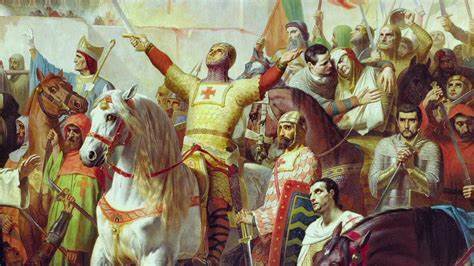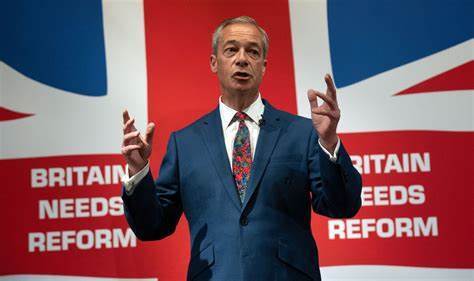Stephen Roney's Blog, page 36
June 10, 2024
A Blot on Canada's History
Not the residential schools--the reporting on the residential schools.
A Blot on Canadaès History
Not the residential schools--the reporting on the residential schools.
June 9, 2024
Hard Times and Great Men

The way governments like the Tories in the UK, or Trudeau in Canada, are imploding looks like divine intervention. But so does the concomitant rise of political figures with unique, uncanny talents: Farage, Poilievre, and Trump. All are masterful rhetoricians; all are brilliant off the cuff; all work without notes; all convey sincerity.
How is it that these hard times seem to produce the needed man?
We saw the same thing circa 1980. After a time of ennui, of decline and relative social chaos, we saw at once Thatcher in Britain, Reagan in the US, and Pope John Paul II; one might also cite Trudeau in Canada, although he was not new in power. He rose in response to an earlier crisis, that of Quebec separatism; but was still in power 80-84.
And we saw it in the great leaders who rose in response to WWII: Churchill, De Gaulle, Tito.
I theorize that such talents are always about. However, so long as things are going well, nobody wants to listen to them. Churchill spent years in the wilderness. Partly due to envy, partly due to a sense that they might change things too much: safer to elect a cipher, so long as things are going well enough. There is also, in the back of our minds, the fear that any one individual who is too skilful and strong might be able to turn his office into a dictatorship.
I think, however, this last fear is misplaced. Those who are especially skilful are least tempted to seize power; they can achieve it legitimately. Not only did Churchill leave office peacefully, for example; he declined a peerage. A guaranteed office was an insult to his talents as a “man of the commons.” De Gaulle walked away from power twice. Washington limited himself to two terms. Dictators are usually unimpressive sorts who rise above their competence, and so need to strongarm to stay there. They are the relatively obscure backroom players, like Putin, or Stalin, or Mao, or Ghaddafi, or Saddam, or Franco, or Kim Il-Sung, or Pol Pot, or, I might say, Pope Francis, who seem to emerge from the shadows. They appear on the dias, and people ask themselves, “Who is this guy?”
Granted that some dictators are the exception. Hitler and Mussolini are exceptions; as is Canada’s Trudeau. They were prominent figures before being elected, and had political skills. But I think it can fairly be said that they were all three clearly unqualified for their role of governing, of management. So they resorted to force and subterfuge.
Trump, Poilievre, and Farage all, in their way, have extensive management experience.
Nor did Hitler, or Mussolini, radiate spontaneity and a sense of sincerity, as Poilievre, Farage, and Trump do.
They are not the stuff of which dictators are made.
'Od's Blog: Catholic comments on the passing parade.
June 8, 2024
Sunak the D- Day Dodger
Many are stumped by Rishi Sunak’s decision to cut short his attendance at the D Day 80th Anniversary Memorial observances to get back to do a TV interview. Never mind the lack of patriotism: it looked like political suicide.
But then, it looked like political suicide when Sunak called the election, down so far in the polls, with months to go on his mandate. And it seemed a strange lapse when he unnecessarily called it outdoors in the rain, without an umbrella; when he posed before an Exit sign for the photographers; or gave a campaign s at the Titanic Museum.
What on earth, they wonder, can be going on? Can Sunak and his advisors all be so incompetent?
God would seem to be intervening in events. It works through our consciences: those who know they are in the wrong will, over time, deliberately sabotage themselves. They will taunt fate, until they are finally caught. When the police finally do catch a serial killer, the murderer falls asleep—and sleeps for some time. It is as if a great weight has been taken off their shoulders. At last all the tension is gone, and things are back as they ought to be.
Dostoyevsky captured the sentiment in Raskolnikov in Crime and Punishment.
This is why trials by ordeal, and duels, were once used to achieve justice. This is why, in war, if one side clearly has the moral high ground, they will win.
Sunak and the Tories know they have betrayed their supporters, and botched things through their intraparty power struggles. Sunak knows nobody elected him, and he is illegitimate. They cannot bear the pressure. They cannot rest until they are properly chastised for it.
We see something similar with Trudeau’s government in Canada. They have become gradually more brazen in their abuse of power. Caught out on the Covid vaccine, they demanded total lockdowns and a vaccine mandate. Called out on the lockdowns and the mandate, they responded by declaring the Emergency Act and seizing bank accounts. Faced with spiralling inflation from their spending, they double down on the carbon tax, alienating their strongest regional base. And try to force farmers to grow less food, limiting fertilizer. And they keep passing laws to silence dissent.
Recently, when a Conservative on committee demanded the names of MPs who seem to be guilty of treason, of aiding foreign powers to spy on Canadians, the response from the Liberal across the table was “Boo Hoo.”
This makes no sense given that they must eventually face the voters. They are saying, in effect, “I dare you all to vote us out of office.”
Given the polls, it cannot be arrogance. It is more like hysteria.
The same is true for the Biden administration and its acolytes, prosecuting Trump and his colleagues. Did they fix the 2020 election? Of course they did; they are quite openly trying to fix 2024. It amounts to an admission of guilt.
The same is so for the “woke” left as a whole. They have collectively jumped the shark. Their demands seem almost deliberately unreasonable. Now we must, for example, pretend that men are women, or be prosecuted.
This makes things weird for the moment, but it also means that the collapse of the left is in progress, and is inevitable.
'Od's Blog: Catholic comments on the passing parade.
June 7, 2024
The Four R's: Reading, Riting, Rithmetic, and Relevance

Courtesy of Indeed, here is a supposedly ideal answer to the standard interview question for teachers, “What is your teaching philosophy?” In other words, this is what your teaching philosophy is supposed to be. And it is utterly wrong:
“My teaching philosophy is to make my lesson plans relatable. In many cases, when a student can’t identify with the material, it’s harder for them to gather meaning. As a literature teacher, my goal is to help students empathize with characters, places and concepts, especially when those things are different from their own life experiences. As a student, I found stories more memorable when my teachers helped me draw parallels. As a student teacher, I like to make comparisons between older texts, like Shakespeare and modern events. For example, comparing events in the plays to events in pop culture. This not only helps students understand the stories but also helps them draw their own conclusions.”
First, the need for students to “identify with the material.” They are supposed to see “their own life experiences” reflected in the material.
This is the opposite of the point of reading a book in the first place. One reads a novel to get away from one’s own everyday life, to experience the world from another’s perspective. Accordingly, the books that sell the best, that people most enjoy, are set in exotic locales and based on improbable situations: Harry Potter, James Bond, superhero comics and movies, the Da Vinci Code, Treasure Island, Peter Pan, Star Wars. The surest way to bore students, and turn them off reading altogether, is to select readings that most closely reflect their own life experience.
Moreover, this is deliberately preventing them from learning, subverting the entire point of going to school. One already knows about one’s own life situation.
For the same reason, it is perverse to suggest that minority voices have traditionally been underrepresented in our literature or in the bookstores. Being exotic has always been an advantage. Pauline Johnson used to perform in buckskin. Grey Owl faked his Indian identity.
As for comparing events in the classical texts to pop culture: always done these days. For years, every text I used had a chapter on the movie “Titanic”; and I could see the students roll their eyes and hear them audibly groan. Not “Titanic” again!
The problems with this approach are many.
First, the students already know pop culture. They are not learning anything; you’re just wasting their time.
Second, they probably know it better than the teacher. It is insulting to presume the teacher knows more than they do about such things. Why? What makes them the authority on Taylor Swift? Just because they’re older? Must the students merely knuckle under to established authority? Is this the lesson being taught?
Third, nothing is so dated and uncool as yesterday’s biggest pop phenomenon. It is impossible to stay current. Especially in textbooks, which take at least a year from composition to publication, and then remain in circulation for years. Pop culture references will always be dated, and wincingly uncool.
Fourth, everyone will fix on the same obvious pop culture references, going for the biggest bang, the biggest connection with the youngsters, and the thing, like Titanic, so big that even they, uncool old people as they are, are aware of it. Students will encounter the same cultural reference again and again, boring them beyond comprehension. When they could be out learning something.
A similar problem adheres when you try to connect your classic material with “current events.” Nothing is as dead, old, and dull as yesterday’s news. Text can’t possibly keep up, not being reissued daily. To compensate, “current events” in the classroom inevitably means a handful of generic topics: ecology, the environment, or “the environmental crisis”; the issues raised by new technology, considered generically; globalization; peace versus war, and such. There is an obvious problem of ideological bias; but without ideological bias, such topics are desperately repetitious and boring. Yes, pollution is bad. Yes, there are bad things on the Internet. Yes, the world is becoming smaller. Yes, peace is better than war. Snore.
Back in the old days, to avoid these problems, modern history was not taught; only classical history. Modern history, current events? Set that up as formal debates among the students. For the same reason, current novels and recent writing were not taught. Leave those for reading clubs in the common rooms.
Our ancestors had it right.
'Od's Blog: Catholic comments on the passing parade.
June 6, 2024
Those Endless Religious Wars

Friend Maximilian laments that too many people are convinced that only their religion is true; leading to endless strife. If only we could get past this religious prejudice and become more tolerant.
This is a common view. Like most common views, it is the opposite of the truth.
If you do not believe your religion is true, you do not believe your religion. If you nevertheless attend services and go through the public motions, you are a hypocrite.
“When you pray, don’t be like the hypocrites who love to pray publicly on street corners and in the synagogues where everyone can see them. I tell you the truth, that is all the reward they will ever get. But when you pray, go away by yourself, shut the door behind you, and pray to your Father in private.”
“These are the words of the Amen, the faithful and true witness, the ruler of God’s creation. I know your deeds, that you are neither cold nor hot. I wish you were either one or the other! So, because you are lukewarm—neither hot nor cold—I am about to spit you out of my mouth.”
If you believe your religion is true, it follows that, wherever another religion differs from yours, you believe it is false.
Now, does believing another person’s religion is false lead to strife? Do you commonly beat someone up for being in error? Do you want to kick someone down the stairs for thinking 1 + 1 = 7?
Religion imposes on its sincere followers rules for moral conduct; that is what the word “religion” means: “binding.” These involve respect for the rights of others: in a phrase, “do unto others as you would be done by.” All the major religions do this. In that they impose these moral obligations on their followers, they are the main bulwark we have against strife. Laws alone are useless without a moral populace. If the people are not moral, they will not follow them anyway. If the police are not moral, they will not enforce them. If the judges are not moral, neither will they. Religion is the cement for all social order.
There are and have been wars of religion. There is a problem when two moral systems try to coexist in close proximity. But historically, most wars of religion involve the Muslims. Islam is curious in this regard: it is not just a religion, but a political ideology. It requires control of the secular power. This is not true of Buddhism other than Vajrayana, of Hinduism, of Judaism, Taoism, or mainstream Christianity. All are “mystical” faiths operating on the individual level, lacking a political agenda. Protestant sects vary on this point.
So subtract Islam from the equation.
How many religious wars have there been, then, really?
Northern Ireland comes up. But note, Sinn Fein and the IRA were Marxist, not Catholic, and condemned by the Catholic Church. The Ulster Protestants were motivated by religious prejudice, perhaps, but not the other side. In such a case, to blame “religion” or “religions” in general means blaming the victim. Blame the specific religion, or its errant followers.
Take away religion, on the other hand, and what do you have historically? Nazi Germany—the Nazi leadership was pagan or anti-religious, in revolt against Judeo-Christian morality. Soviet Russia and Maoist China, both officially atheist and hostile to religion. The Khmer Rouge and North Korea. The Reign of Terror in Revolutionary France. You have genocide. Inevitably.
Religion is the chief bulwark preventing social chaos, in which the strong simply prey on the weak.
Of course the strong resent religion, and will condemn it if emboldened. Be deeply suspicious of any force or source or opinion that stands against religion.
'Od's Blog: Catholic comments on the passing parade.
June 5, 2024
Love Is Love

It’s “Pride Month,” and this week’s flyer from WalMart features a “family pride” section with items for children: Mickey or Minnie Mouse with rainbow colours on their trousers or hair bow. “Rainbow Brite” and “Rainbow High” dolls. Pillows that say “Love is Love.”
Nothing that explicit. But “Love is Love” of course goes without saying. The reason for the slogan is that here “love” is a code word for “sex”: the message to children is “sex is love.”
This by itself amounts to grooming.
It says something about our society that we have a month dedicated to two of the seven deadly sins, pride and lust. And it is becoming a bigger deal every year, big like Easter, say, with parades and gift-giving and special events.
'Od's Blog: Catholic comments on the passing parade.
June 4, 2024
Proportional Representation

Nigel Farage is now running for a seat at Westminster. He complains, however, that the “first past the post” system that Canada shares with Britain makes it difficult for new parties. The current government of Canada managed only 33% of the vote last election, and fewer votes than the opposition Conservatives. Reform in the UK could surpass the Tories in votes, but win almost no seats. This does not reflect the popular will.
I’m not convinced majority rule is the end-all goal here. It is more important to have a system of any sort that ensures an orderly transition of power. Since first past the post is tried and true, it is risky to tamper with it.
Second, majority rule always risks oppression of minorities. Nazi Germany is the obvious example. It makes sense to have checks and balances, like the riding system, which elects representative voices by region, to protect regional minorities.
Third, first past the post is simple; making elections harder to steal.
Fourth, proportional representation almost never produces a majority government. This makes it hard for any government to pursue a consistent and rational policy; they must govern as part of an unstable coalition, making ad hoc deals. That leads to inconsistency and unpredictability which makes it harder for people to manage their lives. And said coalitions could fall at any moment. A lot of fuel is burned just taking care of business.
But let us suppose we nevertheless want proportional representation, or some form of voting that more justly reflects the popular will. Here’s my proposal:
For the House of Commons, go to the Irish system of ranked ballots: if there are five candidates in a riding, you can number your preferences on the ballot, 1 through 5. If no candidate gets 50%, the bottom candidate is dropped from the count, and his votes reassigned based on second preference; and so on until one candidate reaches the 50% threshold. This would end the problem of wasted votes and the need for strategic voting. The system is still simple enough that fraud is unlikely. All the current systems could still be used, including the same ballots. If some voter is confused by or does not know about the ranked ballot, his ballot, simply marked as now with an x beside one candidate, could still be counted just as it is now. So nothing is lost.
And then the Senate; widely criticized now for being unelected and serving no purpose. For the sake of illustration, say it has 100 seats. These seats could be assigned proportionally, based on the percentage each party achieves in the popular vote for commons seats. This way, every small or new political party would have a voice, given that they attract as little as 1% of the vote. Each party puts up and advertises their ranked slate of 100 candidates. One party gets 40% of the vote—they seat their first 40 candidates. One gets 30%--they seat their first thirty. Again, this requires no change in the actual voting system, only in how the vote count is applied. Little chance of fraud or gumming things up.
A Senate majority would be almost impossible; a problem with proportional representation. But it need not matter. The Senate would, as now, not be empowered to initiate legislation. Allow it only to repeal existing legislation, and legislation in effect for at least a year (or some other time span).
This way, it would not hamstring the government in the Commons, but would be a check on bad policy and a force preventing government from getting too large or regulations too Byzantine. The incsntive would be to always be looking for things to repeal.
By electing the Senate by this method, from the national vote totals, it would also be a voice for national unity, in counterbalance to the regional voices of the riding system.
Britain could do the same with the anachronistic House of Lords.
Who’s with me on this?
'Od's Blog: Catholic comments on the passing parade.
June 3, 2024
Diversity Is Our Strength

“Diversity is our strength” has been a popular slogan in Canada for many years.
Is it true?
Afghanistan stands as the ultimate model of ethnic diversity. “Afghanistan's 2004 Constitution cited Pashtun, Tajik, Hazara, Uzbek, Turkman, Baluch, Pashaie, Nuristani, Aymaq, Arab, Qirghiz, Qizilbash, Gujur, and Brahwui ethnicities; Afghanistan has dozens of other small ethnic groups.” (CIA World Fact Book)
Another diverse nation was the old Yugoslavia, with roughly comparable populations of Serbs, Croats, Bosnian Muslims, Slovenes, Albanians, Hungarians, Montenegrins and Macedonians.
Another was the old Austro-Hungarian Empire; one might also cite the Balkans generally.
Iraq is diverse: Sunni and Shia Arabs, Kurds, Yazidis, Turkmen, Assyrians, Mandaeans.
In all these examples, diversity does not seem to have been their strength. Instead, it hindered development, made these places relatively ungovernable, and led to bloodshed. Diversity was and is their weakness.
Diversity is a strength only in the context of more fundamental unity. America has been successful, because it had a powerful mainstream, and the motto was e pluribus unum. Immigrants intentionally shed their home culture by coming. Other, successfully diverse countries, like Singapore, India, or the UK, feature one overwhelmingly dominant ethnic group and culture. And even they have had their problems: Singapore was thrown out of Malaysia for being too Chinese, India underwent the holocaust of partition, and there is ongoing trouble Kalistani Sikhs and Tamil Tigers; and the UK underwent the Irish wars of separation and, as recently as the nineties, the Ulster troubles.
Unity is strength; diversity is good for choice of restaurants.
Multiculturalism, as an official policy, is suicidal.
'Od's Blog: Catholic comments on the passing parade.
June 2, 2024
Twelve Rules for Life

I have not read Peterson’s Twelve Rules for Life. I do not intend to read it. So it is no doubt iunfair of me to criticise it. But its subtitle to my mind tells the story: “An Antidote to Chaos.” This is why I will not read it, and surely I can criticize the assumptions implicit in that subtitle.
It is, in the end, a book on ethics—that’s what “rules for life” means. It therefore seeks to replace traditional ethical codes, like the Ten Commandments.
This already sinister, and this is the problem with psychology in general: it substitutes random thoughts for religion. This is dangerous. “Psyche” means soul; the real, tried and true, wisdom concerning the soul, developed and preserved over millennia, is religion. “Scientific” psychology, by contrast, is never going to be as reliable. It claims to be superior as “science,” yet it has no scientific basis. The soul cannot be seen through a microscope. It is always only one guy expressing his opinions. Religion, by contrast, is the accumulated wisdom of the best minds over many generations.
And the real attraction of psychology to those who subscribe to it is not that it is “scientific” or more reliable. No serious student of the matter could think so. Its attraction is that it promises to dodge the traditional ethical demands. It is not “judgemental.” It accepts and promotes free sex, for just one example, and considers any guilt feelings bad. So those with a guilty conscience will cling to it, and with a fierce devotion never seen among the religious defending their faith.
The subtitle makes it clear that Peterson is doing this here. The goal of his rules, of his proposed ethics, is avoiding chaos rather than doing good or avoiding evil.
Avoiding chaos is not a worthy goal. It sounds good, but sometimes order is not desirable. New ideas emerge from and create chaos. Have you ever seen a photograph of Einstein’s desk at Princeton? Push order as prime directive, and everything comes to a dead stop. The garden dies.
Reputedly, Peterson also identifies chaos with the feminine, and order with the masculine. He refers to chaos as “the eternal feminine.” He claims, apparently, that this is not his idea; it is a consistent association in world myth.
But it is not. Peterson has apparently not studied world myth that deeply. As is typically the case with psychologists; their knowledge is superficial, and they latch on to one or two motifs that seem to them to confirm their pre-existing ideas. Freud’s complete inversion of the story of Oedipus for his “Oedipus Complex” being the most famous example.
In China, the dragon, lung, masculine, represents the Emperor. The phoenix, feng, feminine, represents the Empress. The dragon is the unbridled forces of nature. The phoenix is the bridle: grace and order. The feminine civilizes the masculine energy.
The very personification of order, and the moral order, in Greek mythology, is Dike, and she is feminine. Conversely, Zeus, the principle male deity in the Greek pantheon, is the storm god: an image of chaos. Who, not incidentally, cannot keep his fly zipped.
In the legend of Gilgamesh, the world’s first known epic, Enkidu, the wild man, is civilized by his first encounter with a woman.
In the Jewish and Christian tradition, Logos, order itself, is identified with Sophia, wisdom—and Sophia is always personified as feminine. As she is in the Hindu tradition as well—as the goddess Sarasvati.
Reading psychology is generally a way to get lost in the weeds. It is perhaps the leading cause of mental illness. Arguably, mental illness is entirely a product of psychology. Peterson, although he seems to be taking baby steps towards a more religious view, is still a false prophet.
The tragic thing is that the popularity of the book, and of Peterson, shows there is a tremendous thirst for spiritual guidance. And Peterson and his book are leading these poor vulnerable souls astray.
'Od's Blog: Catholic comments on the passing parade.



